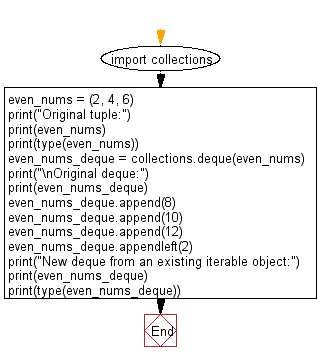Python: Create a deque from an existing iterable object
Python Collections: Exercise-8 with Solution
Write a Python program to create a deque from an existing iterable object.
Sample Solution:
Python Code:
import collections
even_nums = (2, 4, 6)
print("Original tuple:")
print(even_nums)
print(type(even_nums))
even_nums_deque = collections.deque(even_nums)
print("\nOriginal deque:")
print(even_nums_deque)
even_nums_deque.append(8)
even_nums_deque.append(10)
even_nums_deque.append(12)
even_nums_deque.appendleft(2)
print("New deque from an existing iterable object:")
print(even_nums_deque)
print(type(even_nums_deque))
Sample Output:
Original tuple: (2, 4, 6) <class 'tuple'> Original deque: deque([2, 4, 6]) New deque from an existing iterable object: deque([2, 2, 4, 6, 8, 10, 12]) <class 'collections.deque'>
Flowchart:
Visualize Python code execution:
The following tool visualize what the computer is doing step-by-step as it executes the said program:
Python Code Editor:
Have another way to solve this solution? Contribute your code (and comments) through Disqus.
Previous: Write a Python program to create a deque and append few elements to the left and right, then remove some elements from the left, right sides and reverse the deque.
Next: Write a Python program to add more number of elements to a deque object from an iterable object.
What is the difficulty level of this exercise?
Test your Python skills with w3resource's quiz
Python: Tips of the Day
Curries a function.
Example:
from functools import partial def tips_curry(fn, *args): return partial(fn,*args) add = lambda x, y: x + y add1 = tips_curry(add, 20) print(add1(80))
Output:
100
- New Content published on w3resource:
- Scala Programming Exercises, Practice, Solution
- Python Itertools exercises
- Python Numpy exercises
- Python GeoPy Package exercises
- Python Pandas exercises
- Python nltk exercises
- Python BeautifulSoup exercises
- Form Template
- Composer - PHP Package Manager
- PHPUnit - PHP Testing
- Laravel - PHP Framework
- Angular - JavaScript Framework
- React - JavaScript Library
- Vue - JavaScript Framework
- Jest - JavaScript Testing Framework

